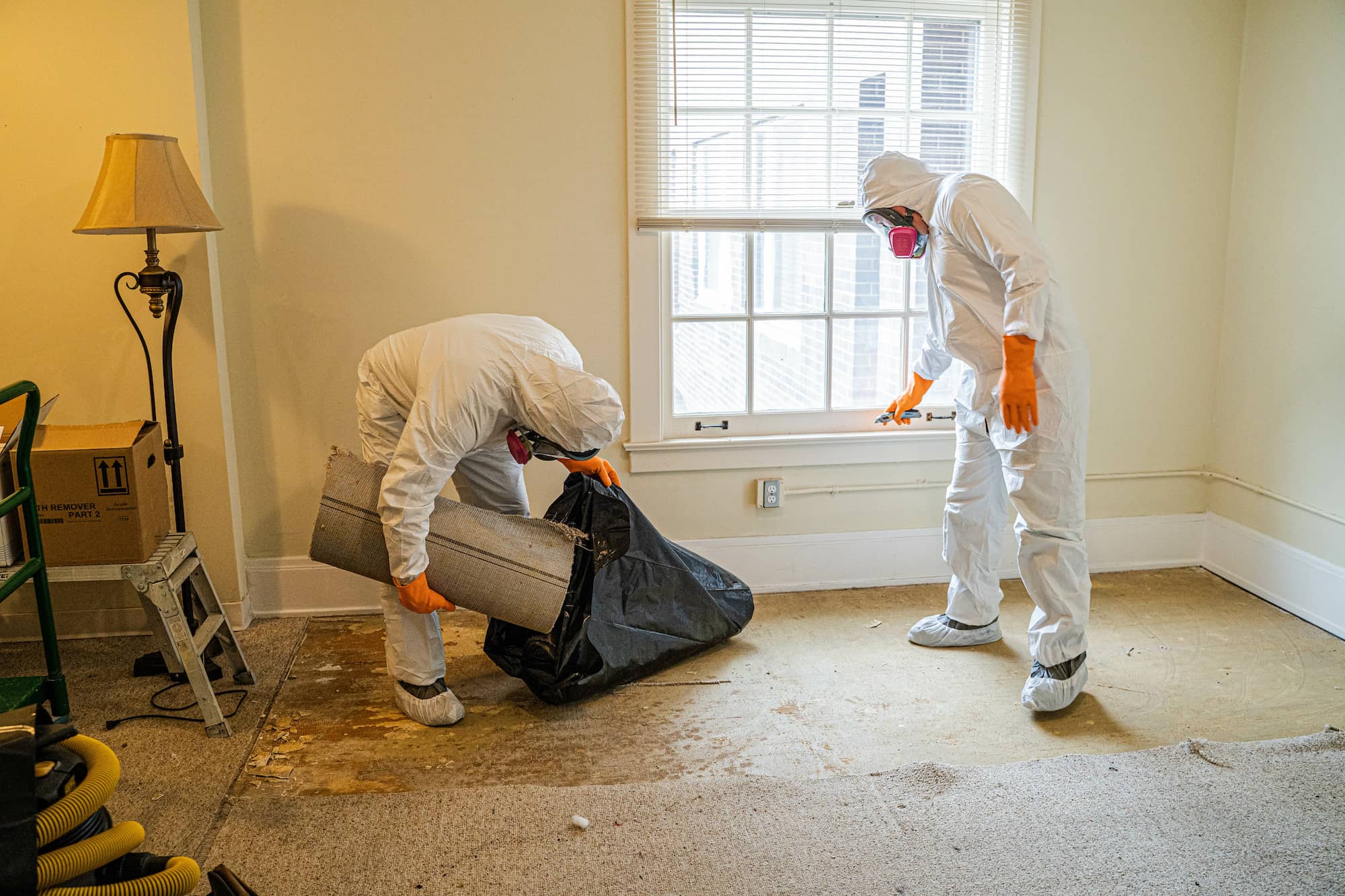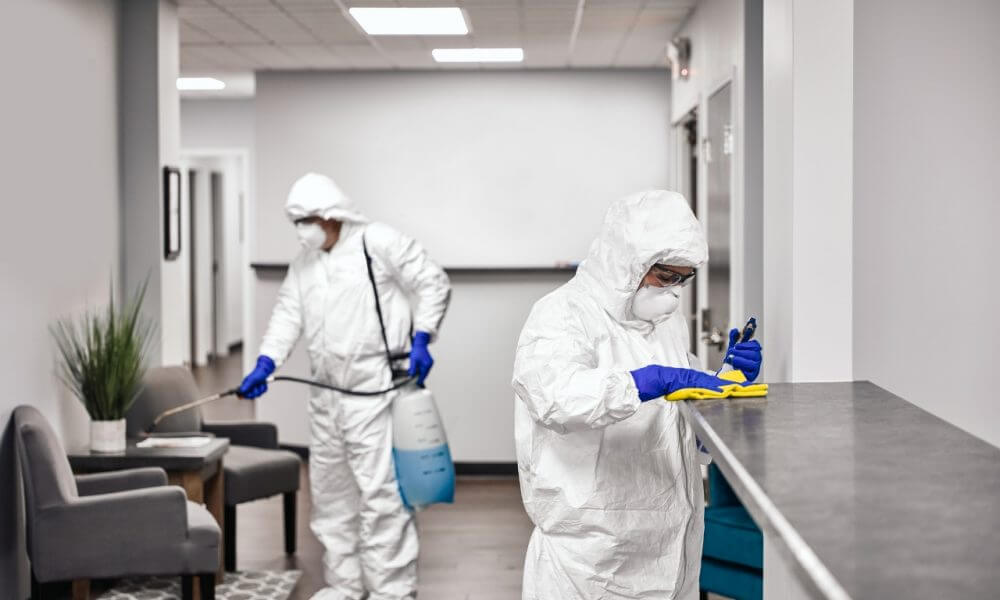Specialist Blood Cleanup: Making Certain Safe and Thorough Purification
Specialist Blood Cleanup: Making Certain Safe and Thorough Purification
Blog Article
Professional Biohazard Cleaning for Crime Scenes, Injury Incidents, and Polluted Areas
In the realm of expert biohazard cleanup, precise interest to information and adherence to security protocols are vital. As we dive into the intricacies of biohazard clean-up for these delicate atmospheres, a deeper understanding of the obstacles and essential procedures included will arise, shedding light on the essential role of expert cleanup solutions in bring back security and peace of mind.

Importance of Biohazard Cleanup
Biohazard cleaning adhering to crime scenes and injury cases is crucial for ensuring the security of individuals and the setting. When these cases happen, they commonly leave a selection of biohazards such as blood, bodily liquids, and other possibly transmittable materials. These substances can nurture unsafe pathogens like infections and microorganisms, presenting significant wellness dangers otherwise appropriately cleaned up and sanitized.
Professional biohazard cleaning solutions are educated to take care of these dangerous products safely and successfully. They have the necessary equipment, such as individual safety equipment and specialized cleansing representatives, to thoroughly sanitize the impacted locations. By turning over the clean-up to experienced specialists, people can avoid direct exposure to hazardous pathogens and stop the spread of contagious conditions.
Additionally, correct biohazard cleaning is crucial for safeguarding the setting. Improper disposal of biohazardous products can contaminate dirt, water resources, and air, posturing a threat to wild animals and the community. By following strict clean-up protocols, experts can guarantee that biohazards are safely gotten rid of and gotten rid of in accordance with guidelines, minimizing the danger of environmental contamination.
Sorts Of Biohazards Encountered
Numerous harmful materials frequently come across in criminal offense scenes and injury occurrences present significant health and wellness dangers if not handled effectively. Blood and physical liquids are amongst the most common biohazards found in these scenarios. These liquids can lug pathogens such as HIV, liver disease B and C, and various other unsafe bacteria. In addition, cells, organs, and body components can additionally posture major health and wellness hazards due to prospective contamination.
An additional kind of biohazard commonly encountered is sharp objects like needles, broken glass, and other products that can cause injuries and transmit infections. Chemical threats are also a problem, as crime scenes might consist of materials like tear gas, pepper spray, or medicine manufacturing materials that call for specialized handling and disposal procedures to stop additional harm.
Moreover, mold and germs development can happen precede where decomposition or prolonged direct exposure to dampness has occurred. These microorganisms can launch toxic substances and allergens into the air, posturing respiratory dangers to those subjected. In general, biohazard cleanup experts must be fully equipped and trained to efficiently take care of these different kinds of dangerous materials to guarantee the security of themselves and others.
Equipment and Safety Gear
When resolving the vital task of dealing with biohazards come across in criminal activity scenes and injury events, the usage of proper tools and safety equipment is extremely important to guaranteeing the safety of individuals associated with the cleaning procedure. Personal protective equipment (PPE) such as handwear covers, masks, coveralls, and goggles are important to avoid straight contact with potentially unsafe materials. Respirators are crucial when taking care of biohazards that may end up being airborne, securing employees from breathing in hazardous particles. Specialized cleaning devices like biohazard bags, sharps, and disinfectants containers are necessary for the secure collection and disposal of polluted materials. In addition, sturdy equipment such as industrial-grade cleansing representatives, foggers, and ozone generators may be required to extensively disinfect the afflicted area. Making sure that all devices is effectively maintained, consistently evaluated, and utilized according to security guidelines is essential in decreasing the danger of exposure to biohazards during clean-up procedures.
Clean-up Process and Strategies
Detailed and efficient clean-up of biohazardous products from criminal activity scenes and injury events calls for precise attention to information and adherence to strict safety protocols. The cleanup process typically entails numerous essential steps. At first, the location must be evaluated to determine the extent of contamination and the proper cleansing strategies required. Next, all biohazardous products, including blood, bodily fluids, and cells residues, should be meticulously gotten rid of and disposed of based on neighborhood regulations.
Adhering to the elimination of biohazardous products, the affected area undergoes a comprehensive cleaning and sanitation process. This step includes using specialized cleansing agents and tools to ensure that all traces of contamination are eradicated. After cleaning, the area undergoes strenuous screening to verify that it is cost-free and safe of any kind of continuing to be biohazards.

Decontamination and Disposal Treatments
To make certain thorough purification and correct disposal of biohazardous products, adhering to the meticulous clean-up process, details procedures must be diligently followed with stringent adherence to safety protocols. Decontamination involves the removal or neutralization of pollutants to reduce the threat of exposure and spread of unsafe substances. This procedure usually includes cleansing, disinfecting, and sanitizing the damaged location using customized devices and EPA-approved chemicals.
As soon as purification is finished, proper disposal of biohazardous products is important to stop more contamination or damage. Biohazardous waste, such as physical fluids or blood-soaked products, should be carefully accumulated, packaged, and identified according to governing standards. ATP testing. These materials are after that moved to licensed centers for disposal with appropriate networks, ensuring compliance with local, state, and federal policies

Final Thought
To conclude, expert biohazard clean-up is critical for making sure the reliable and risk-free removal of hazardous products from criminal activity scenes, trauma cases, and polluted areas. By using specific equipment, protective gear, and complying with correct clean-up processes and techniques, biohazard cleaning teams can efficiently get rid of and decontaminate of biohazards, decreasing the danger of direct exposure and injury to people and the environment.
As we dive into the complexities of biohazard clean-up for these sensitive settings, a deeper understanding of the obstacles and essential procedures entailed will emerge, losing light on the essential role of expert cleaning solutions in recovering safety and security and peace of mind.
Specialist biohazard clean-up solutions are educated to take care of these unsafe materials safely and effectively. By following stringent cleaning procedures, experts can make certain that biohazards are safely eliminated and disposed of in conformity Biohazard removal with regulations, decreasing the risk of ecological contamination.
On the whole, biohazard cleaning experts have to be trained and fully equipped to effectively handle these different types of unsafe products to make certain the safety of themselves and others.
When addressing the important task of handling biohazards experienced in criminal offense scenes and trauma events, the application of proper devices and safety gear is vital to ensuring the safety of individuals involved in the cleanup process.
Report this page